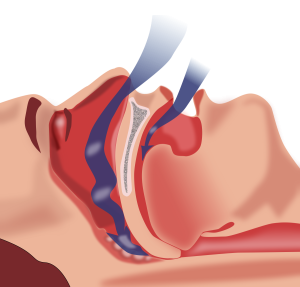Nighttime Apnea and the Importance of Dentistry

Sleep apnea
Nighttime apnea is an increasingly prevalent respiratory disorder characterised by pauses in breathing during sleep. Untreated apnea can lead to serious health consequences, including chronic fatigue, heart problems, and even strokes. However, many need to be made aware of the crucial role that dentistry can play in treating this condition. This article will explore the connection between nighttime apnea and dentistry and how dental treatments can significantly improve sleep quality and overall health.
OSA, CSA e MSA
Nighttime apnea is a sleep disorder characterised by interrupted breathing during sleep. There are three main types of nighttime apnea:
- obstructive sleep apnea (OSA)
- central sleep apnea (CSA) and
- mixed sleep apnea (MSA).
OSA, the most common type, is caused by obstruction of the upper airways. This often comes from excessive relaxation of the throat muscles during sleep. CSA, instead, is caused by a malfunction of the brain’s signals to the respiratory muscles, while MSA combines both. The causes of nighttime apnea can vary from patient to patient. It depends on factors such as obesity, anatomical shape of the airways, alcohol and tobacco use, and genetic predisposition.
Dentistry in the Treatment of Nighttime Apnea
Dentistry plays a significant role in treating nighttime apnea, primarily through customised dental devices. These devices, also known as oral appliances or mandibular advancement devices (MAD), are designed to keep the airways open during sleep, thus reducing breathing interruptions. The dentist carefully assesses the patient and tailors the device to their needs, ensuring it is comfortable and practical.
Types of Dental Devices for Nighttime Apnea
Various dental devices treat nighttime apnea, each with unique features and functions. The two main types of devices are adjustable and mandibular advancement devices. Adjustable mandibular advancement devices maintain the jaw in an advanced position during sleep, thus preventing airway collapse. Specialists can modify these devices to fit the patient’s needs and may be more comfortable wearing them than other options. Mandibular advancement devices move the jaw forward, increasing the space between the upper airway structures and reducing the risk of obstruction during sleep. These devices are also customised to fit the patient’s mouth and are widely used to treat nighttime apnea.
Benefits of Dental Treatments
Dental treatments for sleep apnea offer several advantages over other treatment options, such as CPAP (Continuous Positive Airway Pressure) devices. Firstly, dental devices are often more comfortable than CPAP masks, which can significantly enhance patient compliance with the treatment. Moreover, dental devices are less invasive and more discreet, allowing patients greater freedom of movement during sleep. These factors will help to improve sleep quality and increase overall patient satisfaction.
Dental Consultation and Treatment
If you suspect having sleep apnea, it is crucial to consult a dentist who is experienced in treating the condition. During the initial visit, the dentist will carefully analyse the patient’s medical history and symptoms and assess the structure of their airways and jaw position. The dentist can, after that, recommend the most appropriate treatment, which may include using a customised dental device. Serious patient monitoring during the treatment is indicated to evaluate the device’s effectiveness and make necessary adjustments to optimise the results. The dentist will also provide ongoing consultation and support to ensure the patient is satisfied with the treatment and to achieve the best possible outcomes for their health and well-being.



